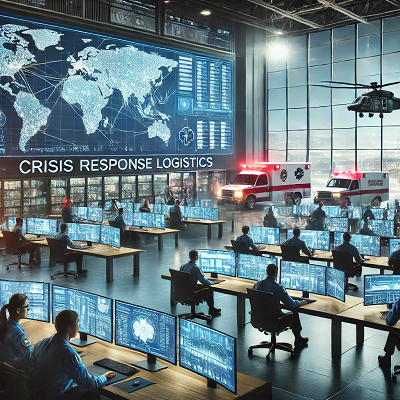Skip to content
 Show More
Show More

Crisis Response Logistics

About Course
Course Overview for Crisis Response Logistics
The Crisis Response Logistics course is designed to equip learners with the knowledge and skills necessary to manage and optimize logistics in emergency scenarios. Whether responding to natural disasters, pandemics, or conflict zones, the course provides practical frameworks, tools, and strategies to navigate complex logistical challenges effectively. With a focus on preparedness, real-time response, and recovery, this course is essential for professionals in humanitarian aid, disaster management, and supply chain operations.
Course Benefits
- Comprehensive Understanding of Crisis Logistics
Gain insights into the unique challenges and requirements of logistics during crises, ensuring you’re well-prepared to respond efficiently. - Hands-On Skills for Real-World Application
Learn practical tools and techniques, including risk assessment, supply chain management, and innovative technologies like GIS and drones. - Enhanced Decision-Making Abilities
Utilize data-driven methods and strategic planning to make informed, impactful decisions during high-pressure situations. - Increased Professional Competence
Strengthen your ability to collaborate with diverse stakeholders, adapt to dynamic conditions, and lead effective crisis response operations. - Career Advancement Opportunities
Build a strong foundation for roles in humanitarian organizations, government agencies, and private-sector emergency logistics teams.
Learning Outcomes
By the end of this course, participants will be able to:
- Understand Crisis Logistics Fundamentals
Define the scope and importance of crisis response logistics and identify key stakeholders and their roles. - Develop Risk Assessment and Preparedness Plans
Conduct thorough risk assessments, design preparedness strategies, and implement scenario-based planning. - Manage Supply Chains in Emergency Contexts
Design effective supply chains, address procurement challenges, and overcome last-mile delivery obstacles. - Leverage Technology and Innovation
Apply cutting-edge technologies and innovative tools to enhance logistical efficiency and transparency. - Execute Effective Crisis Response Operations
Coordinate with stakeholders, manage rapid deployments, and establish robust monitoring systems. - Contribute to Recovery and Resilience Building
Transition from response to recovery, incorporate lessons learned, and strengthen systems for future crises.
Course Content
Module 1: Introduction to Crisis Response Logistics
Module 2: Risk Assessment and Preparedness
Module 3: Supply Chain Management in Emergencies
Module 4: Technology and Innovation in Crisis Logistics
Module 5: Crisis Response Operations
Module 6: Recovery and Post-Crisis Logistics
Student Ratings & Reviews

No Review Yet
